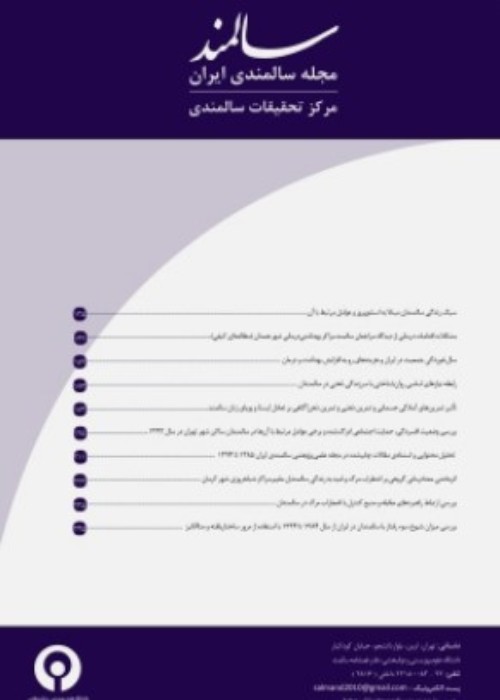Study of Inappropriate Medication Prescribed to Elderly Hospitalized Patients Using the Screening Tool to Alert doctors to Right Treatment
Author(s):
Abstract:
Objectives Medication is an essential component of care for elderly patients, and optimizing their process of treatment is often a challenging task. The aim of this study was to evaluate the status of appropriate non-prescribed drugs in 60 elderly patients hospitalized in the teaching and non-teaching hospitals in the University of Medical Sciences employing the START screening tool.
Methods & Materials This cross-sectional study included 400 elderly patients who were randomly selected from various divisions of the hospital (CCU, ENT, ICU General, Orthopedics, Surgery General, and Internal) and were hospitalized within six months duration (from June to December 2013). The data of the selected patients were collected from the hospital records in order to determine the appropriate medications prescribed based on the criterion START. The data was analyzed- using software Excel 2013 and SPSS 18, and the relationship between the variables was determined using the chi-square test, Mann-Whitney, and Spearman correlation coefficient.
Results The average age of the elderly patients was reported to be 73.4 years. Cardiovascular disease had the largest prevalence (21.6%) and diabetes (3.0) had the lowest prevalence among the elderly patients. The total number of drugs prescribed for patients was 4744, of which 158 patients (39.6%) were not prescribed with at least one appropriate medication. In non-training and training hospitals, the most appropriate medications that were not prescribed according to START were related to the bisphosphonates (11.7% vs. 13.3%) and anti-diabetic (8.3% vs. 11.4%) categories. A significant relationship was noted between the average numbers of non-prescribed appropriate medications and the length of stay of patients in teaching hospitals.
Conclusion Since issues relating to the appropriate medications prescribed among the elderly can have serious implications, the drugs prescribed for the elderly are very important. Supervising the prescription, supply, and rational use of drugs is very vital and effective and acts as an integral part of the health budget allocated to the drug. Therefore, hospitals need to readily consult with the trained physicians and consider the expert opinions of clinical pharmacists in handling this problem.
Methods & Materials This cross-sectional study included 400 elderly patients who were randomly selected from various divisions of the hospital (CCU, ENT, ICU General, Orthopedics, Surgery General, and Internal) and were hospitalized within six months duration (from June to December 2013). The data of the selected patients were collected from the hospital records in order to determine the appropriate medications prescribed based on the criterion START. The data was analyzed- using software Excel 2013 and SPSS 18, and the relationship between the variables was determined using the chi-square test, Mann-Whitney, and Spearman correlation coefficient.
Results The average age of the elderly patients was reported to be 73.4 years. Cardiovascular disease had the largest prevalence (21.6%) and diabetes (3.0) had the lowest prevalence among the elderly patients. The total number of drugs prescribed for patients was 4744, of which 158 patients (39.6%) were not prescribed with at least one appropriate medication. In non-training and training hospitals, the most appropriate medications that were not prescribed according to START were related to the bisphosphonates (11.7% vs. 13.3%) and anti-diabetic (8.3% vs. 11.4%) categories. A significant relationship was noted between the average numbers of non-prescribed appropriate medications and the length of stay of patients in teaching hospitals.
Conclusion Since issues relating to the appropriate medications prescribed among the elderly can have serious implications, the drugs prescribed for the elderly are very important. Supervising the prescription, supply, and rational use of drugs is very vital and effective and acts as an integral part of the health budget allocated to the drug. Therefore, hospitals need to readily consult with the trained physicians and consider the expert opinions of clinical pharmacists in handling this problem.
Keywords:
Language:
Persian
Published:
Iranian Journal of Ageing, Volume:11 Issue: 41, 2016
Page:
280
magiran.com/p1574451
دانلود و مطالعه متن این مقاله با یکی از روشهای زیر امکان پذیر است:
اشتراک شخصی
با عضویت و پرداخت آنلاین حق اشتراک یکساله به مبلغ 1,390,000ريال میتوانید 70 عنوان مطلب دانلود کنید!
اشتراک سازمانی
به کتابخانه دانشگاه یا محل کار خود پیشنهاد کنید تا اشتراک سازمانی این پایگاه را برای دسترسی نامحدود همه کاربران به متن مطالب تهیه نمایند!
توجه!
- حق عضویت دریافتی صرف حمایت از نشریات عضو و نگهداری، تکمیل و توسعه مگیران میشود.
- پرداخت حق اشتراک و دانلود مقالات اجازه بازنشر آن در سایر رسانههای چاپی و دیجیتال را به کاربر نمیدهد.
In order to view content subscription is required
Personal subscription
Subscribe magiran.com for 70 € euros via PayPal and download 70 articles during a year.
Organization subscription
Please contact us to subscribe your university or library for unlimited access!



